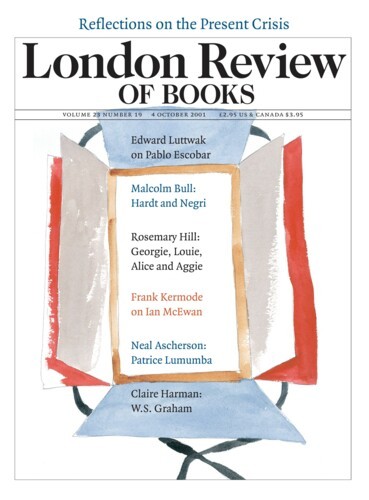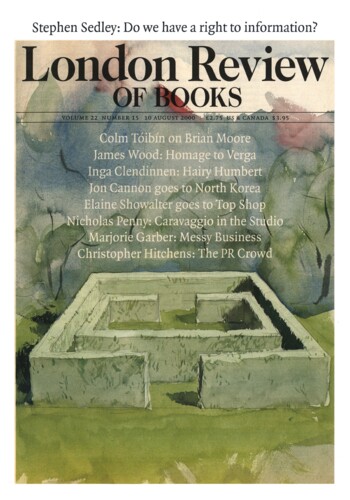Colm Tóibín
Colm Tóibín’s novels include The Blackwater Lightship, Brooklyn, Nora Webster, The Master and The Magician. He has written for the LRB on subjects including Thomas Mann and the Mann family, the Irish Famine, Mary Queen of Scots, Elton John, gay priests, Venice during lockdown and being diagnosed with cancer.
Gaelic Gloom
10 August 2000
Podcasts & Videos
Sisters Come Second
Colm Tóibín, Andrew O’Hagan and Malin Hay
In his introduction to our twelfth LRB Collection, Sisters Come Second, Colm Tóibín writes that most siblings dream of being only children. Malin Hay explores this idea with Colm and Andrew O’Hagan,...
This Bad Business
Colm Tóibín and Thomas Jones
Colm Tóibín talks to Thomas Jones about the breakdown of Elizabeth Hardwick’s marriage to Robert Lowell, and its literary consequences.
‘It’s curable,’ he said
Colm Tóibín
Colm Tóibín reads his account of being treated for cancer.
Mothers and Mary
Colm Tóibín
Colm Tóibín discusses The Testament of Mary and his life and work generally with Michael McGirr, at the Melbourne Writers Festival, 2013.
Where now for the Catholic Church?
Colm Tóibín
Colm Tóibín talks to Barney Zwartz, Morag Fraser and Peter Horsfield about the new pope and whether reform is possible within the Catholic Church.
Colm Tóibín: Elizabeth Bishop and Thom Gunn
Colm Tóibín
Colm Tóibín unpacks the work of Elizabeth Bishop and Thom Gunn, and the relationship between the poets, with help from recordings from the archive of 92nd Street Y in New York.
Easter 1916
Colm Tóibín
Colm Tóibín tells the story of Easter 1916, following the main personalities involved, including Thomas Clarke and Patrick Pearse.
Colm Tóibín: Telling the story of Easter 1916
Colm Tóibín
Colm Tóibín talks about the process of writing his history of the Easter 1916 rebellion for the London Review of Books.
Pieces about Colm Tóibín in the LRB
Closet Virtuoso: Magic Mann
Seamus Perry, 24 February 2022
Colm Tóibín is not the first person to advance an interpretation of Thomas Mann as a virtuoso of life in the closet, and he generously lists in an appendix the numerous works of scholarship he has consulted....
Echoes and Whisperings: Colm Tóibín’s ‘Oresteia’
Colin Burrow, 1 June 2017
At the start of Aeschylus’ Oresteia a watchman sees a flaming beacon. This is supposed to be the sign that Troy has fallen and that Agamemnon is coming home from the Trojan war. The...
The lighthouse stares back: Tóibín on Bishop
Matthew Bevis, 7 January 2016
‘Nobody knows … nobody knows.’ Elizabeth Bishop said her grandmother’s remark was the chorus of her childhood. ‘I often wondered what my grandmother knew that...
The Coldest Place on Earth: Colm Tóibín’s ‘Brooklyn’
Liam McIlvanney, 25 June 2009
Eilis Lacey is a young Enniscorthy woman who has never dreamed of leaving Ireland. Friary Street and Castle Street, the square and the cathedral: the grey co-ordinates of her small County Wexford...
What Henry didn’t do: ‘The Master’
Michael Wood, 18 March 2004
‘It’s, on the whole, I think,’ Henry James wrote to Edmund Gosse, ‘a queer place to plant the standard of duty.’ The letter is dated 7 January 1893, 29 years before...
The Sacred Cause of Idiom: Lady Gregory
Frank Kermode, 22 January 2004
The possession and use of a toothbrush was a mark of the difference between us and them, gentry and peasant, or so Lady Gregory suggested when she made the remark – jocular, perhaps, and...
Mothering: The Blackwater Lightship by Colm Tóibín
Terry Eagleton, 14 October 1999
‘You know, in my family,’ remarks a gay Irish architect in Colm Tóibín’s The Blackwater Lightship, ‘my brothers and sisters – even the married ones...
His Socks, His Silences
Adam Mars-Jones, 3 October 1996
Colm Tóibín’s frustrating new novel starts from a pleasingly skewed perspective: its narrator Richard Garay (less often, Ricardo) was brought up in Buenos Aires, child of an...
Poped
Hugo Young, 24 November 1994
In Kiev in 1992, Colm Tóibín met the Bishop of Zhytomir, who was dressed in his full regalia. ‘He had that wonderful, well-fed, lived-in look that reminded me of several Irish...
Thick Description
Nicholas Spice, 24 June 1993
To write simply is always to seem to write well. Bad writing is usually identified with over-writing: too many adjectives and adverbs, flowery figures of speech, verbosity. No one is ever accused...
Motiveless Malignity
D.A.N. Jones, 11 October 1990
Ever since 1958, when his play The Birthday Party opened in London, Harold Pinter has been admired by the judicious for the witty realism of his dialogue and the engrossing mystery of his...
Read anywhere with the London Review of Books app, available now from the App Store for Apple devices, Google Play for Android devices and Amazon for your Kindle Fire.
Sign up to our newsletter
For highlights from the latest issue, our archive and the blog, as well as news, events and exclusive promotions.


